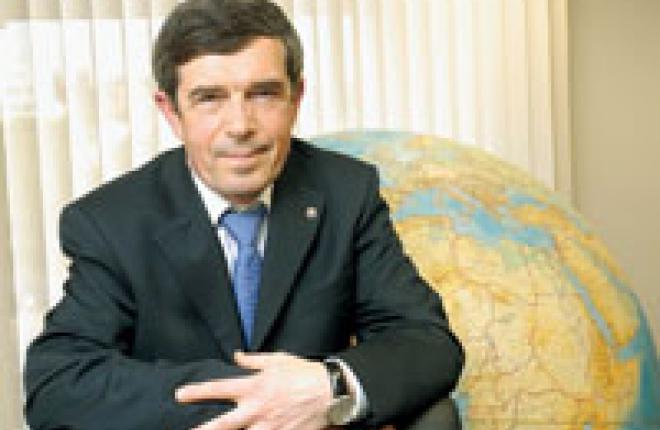Russian arms mean reliability, quality, success

Rosoboronexport, the sole Russian state arms trade company entitled to export the whole range of military and dual-purpose products, technologies and services, is currently marking its tenth anniversary. The company accounts now for more than an 80% share in Russia’s foreign military sales. In his interview to Russia & CIS Observer Anatoly Isaykin, Director General of the Rosoboronexport Corporation, highlights the main achievements and explains how the company develops long-term partnerships with foreign countries under the motto "Efficiency. Reliability. Quality".
— The tenth anniversary is a good occasion to measure the achievements. How successful was the Corporation’s business in these years?
— Every year Rosoboronexport increases its foreign sales value by $500-700 million. As a result, the amount of foreign military sales carried out by Rosoboronexport has augmented for the last ten years almost by two and a half times.
The nomenclature of military-purpose products offered for export increases from year to year. Now it includes several thousand items that are equal in quality with the best world products and even surpass them in some respects. Russian combat systems are actively adapted to meet NATO standards and are in demand among member-states of this military political organization. Russian weapons and military equipment are favorably distinguished from competing products by their permanent advantage in cost-effectiveness. All the above have allowed Russia to keep for many years the second place in the arms sales value.
But military technical cooperation is not a pure "arms trade". It occupies a specific zone within the Russia’s foreign economic activities where long-term mutually beneficial partnerships with foreign countries are built. It is only natural as procured arms will be in service for 20, 30 or even 50 years. When an importing country purchases our arms, it entrusts us with the most precious state issue - its security, and ultimately – its independence and territorial integrity. Such country becomes a long-time reliable ally of Russia in both military-political and economic areas. When supplying weapon systems, Rosoboronexport observes all international conventions, does not violate the established force balance in the regions nor allows illegal proliferation of weapons around the world and their falling in the hands of terrorist organizations and rogue totalitarian states.
— Who are the major recipients of the Russian arms at the moment?
— Russian military-purpose products have been delivered to much wider geographical destinations. At present Rosoboronexport maintains cooperation with some 70 countries. If previously India and China took up the main share of contracts (up to 80% of sales value), they are now joined by other importers which have become major Russian arms recipients, such as Algeria, Venezuela, Vietnam, Malaysia, Indonesia and some other countries. The Corporation is proactive in developing new markets. Latin American countries are a good example of such markets. In this region there are contracts signed with Peru, Columbia, Brazil, Argentina, Cuba that are being implemented. Prospects also exist for promotion of Russian arms to Chile, Uruguay, and Ecuador.
Military technical cooperation with countries in South East Asia, the Middle East, and North Africa is continued on a mutually beneficial basis.
We maintain military technical cooperation with our close neighbors from the Commonwealth of Independent States (CIS) and the Collective Security Treaty Organization (CSTO) within the guidelines of the Russia’s state policy. Our partners are offered substantial preferences. This is also natural since armed forces of the CIS/CSTO countries are equipped with Soviet and Russian-made weapons. We are developing very dynamic mutually advantageous relations in this area with Azerbaijan, Belarus, Kazakhstan, and other member-states.
— Russian defense exporters were previously criticized for insufficient after-sale support for the delivered arms and military equipment. What is the Corporation’s strategy in this direction?
— Rosoboronexport continues to improve its exports business concept in collaboration with foreign partners. If previously military equipment was sold as it was, now it is offered with a set of services intended to support the procured weapons during their life cycle, including: maintenance, upgrading, repairs, and even disposal when the service life has been ended. Many customer states set up their own repair bases and servicing centers, and organize upgrading works and training of combat crews and technical personnel. In India, for example, the Rosoboronservice joint venture has been established to provide after-sale servicing of ships, aircraft and helicopters. Preparations are done for opening similar centers in other regions. In India also functions the T-90S main battle tank license production plant.
Rosoboronexport always tries to help its partners expertly and smoothly integrate new Russian-made equipment into existing defense structures, making the whole system operate efficiently, quickly, harmoniously and reliably. Such approach enhances operational effectiveness of systems and sets of equipment and reduces their cost as well as funds required for building and maintaining a corresponding infrastructure for them.
— It’s not a secret that arms export sales is a vital source of revenues for the Russian defense industry. How do your activities contribute to the development of the domestic manufacturers?
— Rosoboronexport maintains business connections with more than 700 defense enterprises in 56 regions of Russia. Many of these enterprises have been provided with foreign orders for several years to come.
Ссылки по теме
- Для того, чтобы оставить комментарий, не привязанный к социальной сети, войдите или зарегистрируйтесь на нашем сайте.
CIS & Russian Aviation News And Insights
- Aeroflot to add 23 new destinations to its vast summer route network
- Sky Gates Airlines takes delivery of second Ilyushin IL-96-400T
- Superjet 100 flies with Russian engines
- Aeroflot posts first full year profit since pandemic
- Supporting Russia’s fleet of Western-built aircraft is a humanitarian necessity – AmCham Russia
- Rosaviatsiya: Russian airlines’ passenger traffic to decline in 2025
- Aeroflot promotes initiative towards harmonization of Russia’s continued airworthiness system with international standards
- Russia’s Smartavia passenger traffic decreased by 6.7%
- Russian airlines 2024 traffic exceeds the pre-sanctions level









